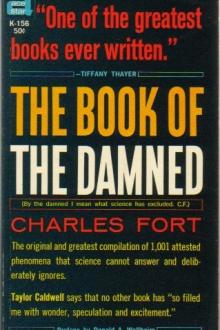Genre Literary Criticism. Page - 1

all the parts of thewatch to the function, or purpose, of showing the time, is held to beevidence that the watch was specially contrived to that end; on theground, that the only cause we know of, competent to produce such aneffect as a watch which shall keep time, is a contriving intelligenceadapting the means directly to that end.
Suppose, however, that any one had been able to show that the watch hadnot been made directly by any person, but that it was the result ofthe modification of another watch which kept time but poorly; and thatthis again had proceeded from a structure which could hardly be calleda watch at all--seeing that it had no figures on the dial and the handswere rudimentary; and that going back and back in time we came at lastto a revolving barrel as the earliest traceable rudiment of the wholefabric. And imagine that it had been possible to show that all thesechanges had resulted, first, from a tendency of the structure to varyindefinitely; and secondly, from something in

the delicate curvesof the shell reflect sounds and harmonies too faint to be otherwisenoticed. A hundred men may pass a hayfield and see only the sweaty toil andthe windrows of dried grass; but here is one who pauses by a Roumanianmeadow, where girls are making hay and singing as they work. He looksdeeper, sees truth and beauty where we see only dead grass, and he reflectswhat he sees in a little poem in which the hay tells its own story:
Yesterday's flowers am I,And I have drunk my last sweet draught of dew.Young maidens came and sang me to my death;The moon looks down and sees me in my shroud,The shroud of my last dew.Yesterday's flowers that are yet in meMust needs make way for all to-morrow's flowers.The maidens, too, that sang me to my deathMust even so make way for all the maidsThat are to come.And as my soul, so too their soul will beLaden with fragrance of the days gone by.The maidens that to-morrow come this wayWill

lded merit.Inevitably, since the industrial revolution, modernist critics havetended to stress its appeal to class consciousness. This appeal, realthough it is, can be overemphasized. The rude forefathers are notprimarily presented as underprivileged. Though poverty-stricken andignorant, they are happy in family life and jocund in the field."Nature is nature wherever placed," as the intellectuals of Gray'stime loved to say, and the powers of the village fathers, potentially,equal the greatest; their virtue is contentment. They neither want norneed "storied urn or animated bust." If they are unappreciated byAmbition, Grandeur, Pride, et al., the lack of appreciation is due toa corruption of values. The value commended in the "Elegy" is that ofthe simple life, which alone is rational and virtuous--it is the lifeaccording to nature. Sophisticated living, Gray implies in the stanzathat once ended the poem, finds man at war with himself and withreason; but the cool sequestered path--its goal identic

his statements, is hopelessly vain.
It is all undeniable, no doubt; from every side we make out that the criticism of a book--not the people in the book, not the character of the author, but the book--is impossible. We cannot remember the book, and even if we could, we should still be unable to describe it in literal and unequivocal terms. It cannot be done; and the only thing to be said is that perhaps it can be approached, perhaps the book can be seen, a little more closely in one way than in another. It is a modest claim, and my own attempt to assert it will be still more modest. A few familiar novels, possibly a dozen, by still fewer writers--it will be enough if I can view this small handful with some particularity. And I shall consider them, too, with no idea of criticizing all their aspects, or even more than one. How they are made is the only question I shall ask; and though indeed that is a question which incidentally raises a good many others--questions of the intention of the novelist, his c

ken in the history of theworld. The South Gardens adjoin the Avenue of Palms and extend to theExposition enclosure along the south boundary line, where a wall fiftyfeet high and ten feet wide has been erected of a solid green moss-likegrowth, studded with myriads of tiny pink star-like blossoms. This greatwall is perforated by simple arched masonry entrances, leading rough therichly planted foreground formed by the South Gardens.
Basins of reflecting blue waters extend to the right and left of acentral fountain of colossal proportions. The basins themselves arepunctuated at their east and west ends by fountains of subordinate size,back of which are Festival Hall to the right and the Palace ofHorticulture to the left, as we enter the green wall portals from thecity of San Francisco beyond. To the south and west of the ForeignCountries, States Buildings and Gardens, a graceful contour of hillsextends, sloping onward to Golden Gate, and having a coxcomb of pine andeucalyptus. Broad vistas of cit

e city council was backed by a large body of serious opinion throughout the country. A proof of this, if proof were needed, is to be found in the circumstances that gave rise to the Apologie of Sidney.
The attack on the stage had been opened by the corporation and the clergy. It was soon joined by the men of letters. And the essay of Sidney was an answer neither to a town councillor, nor to a preacher, but to a former dramatist and actor. This was Stephen Gosson, author of the School of Abuse. The style of Gosson's pamphlet is nothing if not literary. It is full of the glittering conceits and the fluent rhetoric which the ready talent of Lyly had just brought into currency. It is euphuism of the purest water, with all the merits and all the drawbacks of the euphuistic manner. For that very reason the blow was felt the more keenly. It was violently resented as treason by the playwrights and journalists who still professed to reckon Gosson among their ranks. [Footnote: Lodge writes, "I

at he is hardly even a caricaturist; that he is something very like a realist. Those comic monstrosities which the critics found incredible will be found to be the immense majority of the citizens of this country. We shall find that Sweedlepipe cuts our hair and Pumblechook sells our cereals; that Sam Weller blacks our boots and Tony Weller drives our omnibus. For the exaggerated notion of the exaggerations of Dickens (as was admirably pointed out by my old friend and enemy Mr. Blatchford in a Clarion review) is very largely due to our mixing with only one social class, whose conventions are very strict, and to whose affectations we are accustomed. In cabmen, in cobblers, in charwomen, individuality is often pushed to the edge of insanity. But as long as the Thackerayan platform of gentility stood firm all this was, comparatively speaking, concealed. For the English, of all nations, have the most uniform upper class and the most varied democracy. In France it is the peasants who are solid to uniformi

nd albeit they all leade us with a common accord to despise povertie, and other accidental! crosses, to which
Omnes eodem cogimur, omnium Versatur urna, serius, ocius Sors exitura, et nos in aeternum Exilium impositura cymbae, [Footnote: Hor. I. iii. Od. iii. 25.]
All to one place are driv'n, of all Shak't is the lot-pot, where-hence shall Sooner or later drawne lots fall, And to deaths boat for aye enthrall.
And by consequence, if she makes us affeard, it is a continual subject of torment, and which can no way be eased. There is no starting-hole will hide us from her, she will finde us wheresoever we are, we may as in a suspected countrie start and turne here and there: quae quasi saxum Tantalo semper impendet.[Footnote: Cic. De Fin. I. i.] "Which evermore hangs like the stone over the head of Tantalus:" Our lawes doe often condemne and send malefactors to be executed in the same place where the crime was committed: to which whilest they are going, leade them along the fairest houses, or

he same goal.
As to physical things, chemic, mineralogic, astronomic, it is not customary to say that they act to achieve Truth or Entity, but it is understood that all motions are toward Equilibrium: that there is no motion except toward Equilibrium, of course always away from some other approximation to Equilibrium.
All biologic phenomena act to adjust: there are no biologic actions other than adjustments.
Adjustment is another name for Equilibrium. Equilibrium is the Universal, or that which has nothing external to derange it.
But that all that we call "being" is motion: and that all motion is the expression, not of equilibrium, but of equilibrating, or of equilibrium unattained: that life-motions are expressions of equilibrium unattained: that all thought relates to the unattained: that to have what is called being in our quasi-state, is not to be in the positive sense, or is to be intermediate to Equilibrium and Inequilibrium.
So then:
That all phenomena in our i

This "borrowing" was nothing unique, either for Disney or for the industry. Disney was always parroting the feature-length mainstream films of his day.3 So did many others. Early cartoons are filled with knockoffs--slight variations on winning themes; retellings of ancient stories. The key to success was the brilliance of the differences. With Disney, it was sound that gave his animation its spark. Later, it was the quality of his work relative to the production-line cartoons with which he competed. Yet these additions were built upon a base that was borrowed. Disney added to the work of others before him, creating something new out of something just barely old.
Sometimes this borrowing was slight. Sometimes it was significant. Think about the fairy tales of the Brothers Grimm. If you're as oblivious as I was, you're likely to think that these tales are happy, sweet stories, appropriate for any child at bedtime. In fact, the Grimm fairy tales are, well, for us, grim. It is a rare and perhaps overly ambitious parent who would dare to read these bloody,